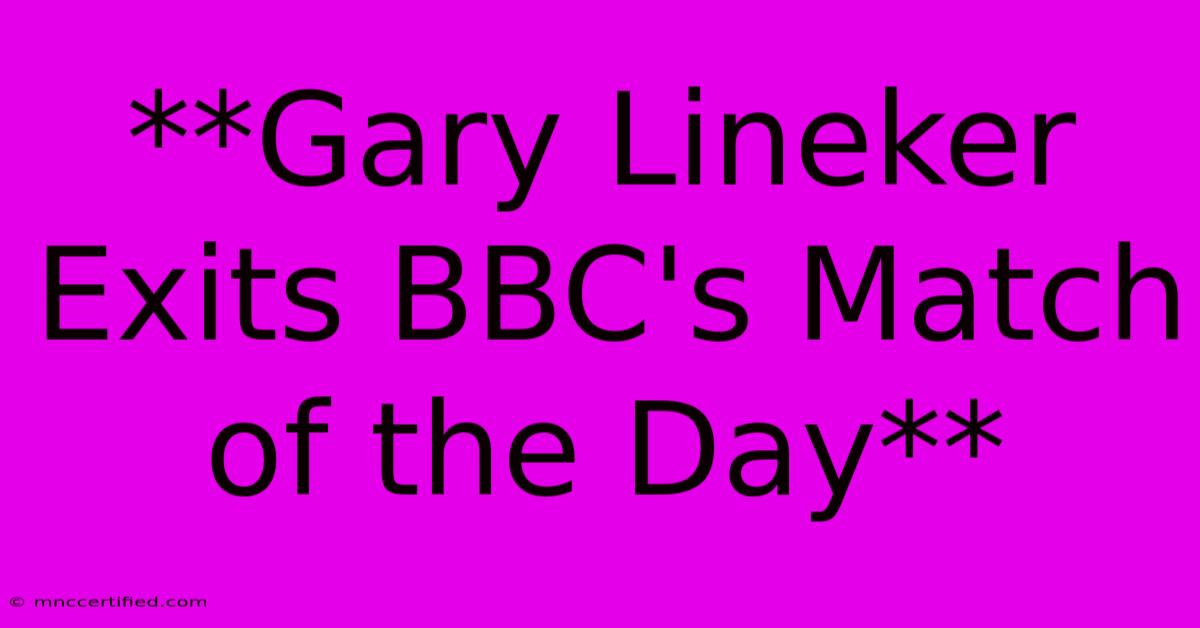**Gary Lineker Exits BBC's Match Of The Day**

Table of Contents
Gary Lineker Exits BBC's Match of the Day: A Look at the Controversy and Impact
The sporting world was shaken when renowned football pundit Gary Lineker announced he would be stepping down from his role as host of BBC's iconic program, Match of the Day. The decision followed a public spat with the BBC over his comments on the government's asylum policy, prompting widespread discussions about freedom of speech, impartiality, and the role of public broadcasting.
Lineker's Comments and the BBC's Response
The controversy ignited when Lineker, a prominent figure known for his outspoken views, tweeted a comparison between the language used to discuss asylum seekers and the rhetoric of 1930s Germany. This sparked a furious reaction from conservative politicians and media outlets, accusing him of drawing a harmful parallel and undermining BBC impartiality.
The BBC, facing pressure to address the situation, swiftly moved to "step back" Lineker from his presenting duties, triggering a chain reaction across the organization. Numerous commentators and presenters, in solidarity with Lineker, refused to participate in the show, effectively paralyzing the program.
The Fallout and Public Reaction
The Lineker saga ignited a fierce debate about the balance between freedom of expression and the need for impartiality in public broadcasting.
Supporters of Lineker argued:
- Free Speech: His comments were protected under the principles of free speech and did not constitute a violation of impartiality.
- Independent Thought: The BBC should allow its presenters to express personal opinions, even if controversial, as long as they do not directly impact their professional duties.
- Political Neutrality: The BBC's response was disproportionate, particularly considering the lack of clear guidelines for presenter behavior outside their work.
Opponents of Lineker argued:
- Impartiality: His tweet directly contradicted the BBC's commitment to impartiality, creating a perception of bias among viewers.
- Public Trust: The controversy damaged the BBC's reputation and eroded public trust in the organization.
- Consequence of Actions: Lineker's comments had real-world consequences, prompting backlash and a potential loss of viewers.
The Future of Match of the Day and the BBC
The situation has raised serious questions about the BBC's future and the role of public broadcasting in a polarized society. While Lineker's return remains unclear, the impact of this controversy is likely to linger.
The incident has prompted calls for:
- Clearer Guidelines: The BBC needs to define stricter guidelines for presenter behavior outside their professional duties, clarifying what constitutes acceptable and unacceptable conduct.
- Greater Transparency: The BBC needs to be more transparent in its decision-making process, explaining its reasoning for actions taken against its presenters.
- Reinforced Impartiality: The BBC must actively promote its commitment to impartiality and ensure its programming remains objective, even in the face of controversial issues.
The Gary Lineker controversy has brought into sharp focus the complexities of balancing freedom of expression with journalistic responsibility. As the dust settles, the BBC faces a critical task of navigating this delicate balance and re-establishing its position as a trusted source of information for the public.

Thank you for visiting our website wich cover about **Gary Lineker Exits BBC's Match Of The Day** . We hope the information provided has been useful to you. Feel free to contact us if you have any questions or need further assistance. See you next time and dont miss to bookmark.
Featured Posts
-
Parsons Criticized By Ryan Woody
Nov 12, 2024
-
Yellowstone Season 5 Part 2 Release Date
Nov 12, 2024
-
Mc Guinness Kicks Off Children In Need Ride
Nov 12, 2024
-
Nato Chief Honors Armistice And Veterans Day
Nov 12, 2024
-
Robinhood Markets October 2024 Operating Report
Nov 12, 2024